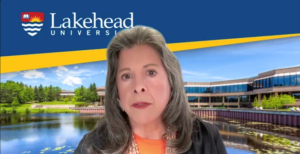Dr. Cynthia Wesley-Esquimaux highlights successes and challenges of universities developing pathways forward to reconciliation

By Rick Garrick
ORILLIA — Chippewas of Georgina Island First Nation’s Dr. Cynthia Wesley-Esquimaux highlighted the successes universities have achieved and the challenges they still face during her “Are universities meeting the challenge of reconciliation?” A conversation with Cynthia Wesley-Esquimaux Zoom presentation on Sept. 28. She noted that Universities Canada introduced its 13 principles for reconciliation in 2015 during her presentation, which was part of Lakehead University’s Truth and Reconciliation event series held during the month of September.
“The 13 principles committed administrators and faculties at Canadian universities to ensure Indigenous peoples were fully represented in every aspect of Canada’s educational institutions, reflecting their needs and their vision for a better future,” says Wesley-Esquimaux, chair on Truth and Reconciliation at Lakehead University. “Have they succeeded? Are they meeting the challenge of teaching and embedding the truth of being an Indigenous person in Canada and setting a clear pathway forward through a reconciliation action plan that engages not only current and future students but influences the future of this country in a good way?”
Wesley-Esquimaux says close to 90 per cent of the institutions have a strategic plan for advancing reconciliation or have a plan in development and more than 50 per cent have a strong education strategy or an action plan specifically to respond to the Truth and Reconciliation Commission’s 94 Calls to Action.
“Nearly 90 per cent of universities with law schools have already or are in the process of updating curricula to require all law students to take a course on Indigenous peoples and the law,” Wesley-Esquimaux says. “Lakehead acted on this Call to Action early, ensuring from the opening of the law school in Thunder Bay in 2013 that there would be Indigenous representation, there would be Indigenous faculty and staff, curriculum development, and the kind of programming that would resonate with Indigenous peoples.”
Wesley-Esquimaux says more than 80 per cent of universities with social work programs are incorporating the history and impacts of Indian Residential Schools into curricula.
“Canadian universities are making progress towards answering these calls and embracing their ongoing responsibility to educate all students in a way that advances reconciliation in Canada,” Wesley-Esquimaux says. “In addition to implementing public strategies and action plans that responded to Calls to Action, universities are updating their curricula across diverse program areas.”
Wesley-Esquimaux says 96 per cent of institutions offer training and resources for non-Indigenous students, faculty, staff, and leadership to support their responsibility to work towards reconciliation.
“Nearly half of the universities have an Indigenous course requirement for at least some of their programs and faculties,” Wesley-Esquimaux says. “Lakehead is the first university in Canada to implement an Indigenous course requirement across all departments. This remains a challenge because while there is a continuing need to teach and embed understanding and truth, there are still not enough Indigenous scholars to go around.”
Wesley-Esquimaux says the quest for reciprocity and knowledge exchange and the advancing of equity in education is tied to collaboration of culturally-safe programming and spaces.
“The challenge for universities is acceptance and use of restorative practices as they move towards truth and a mutual process of reconciliation for everybody in the academic community,” Wesley-Esquimaux says. “It will be necessary to normalize Indigenous knowledges as part of any Canadian education, especially for those Indigenous students who come from foster or adoptive care or were raised in highly colonized spaces, kind of like I was in the city of Toronto.”
Wesley-Esquimaux also highlighted other areas where universities are moving forward, including 72 per cent that have programs with an Indigenous specialization or focus and are specifically designed for Indigenous students, more than 50 per cent that are offering community-based learning programs for Indigenous students and in consultation with Elders, more than 90 per cent that offer financial aid specifically earmarked for Indigenous students, more than 80 per cent that offer academic and general counselling for Indigenous students, more than 50 per cent that have changed their governance structures or processes to incorporate Indigenous practices, and 90 per cent that are working to increase Indigenous representation among faculty and staff and improving retention.
Wesley-Esquimaux adds that nearly 90 per cent of institutions are working to integrate Indigenous knowledge and teaching methods into classrooms on campus.
“This can mean Indigenous students will be given a choice of what they learn and where that learning will take them,” Wesley-Esquimaux says. “There’s a natural exodus back to land-based learning, and given a choice, Indigenous peoples will choose what feels right and good and bolsters who they believe themselves to be. Our task as an academic institution is to strengthen identity and pride and this can happen when they see themselves reflected in the classroom and in the eyes and knowledge faces of their teachers and instructors.”
Wesley-Esquimaux says education makes sense when it reinforces a sense of self.
“When we see a highlighting of Canada’s Indigenous history, our heroes, our knowledges, and our need for equity and balance, we have hope,” Wesley-Esquimaux says. “The goal behind these demands for change is the need to lift Indigenous peoples and appreciate what they’ve been trying to tell Canada since contact, that they have some very powerful knowledges to share, positive ways to be, and they carry forward endless hope for our mutual futures. They are the Water Walkers, the whistle blowers of destructive mining, the holders up of environmental issues, and they have been all along.”


